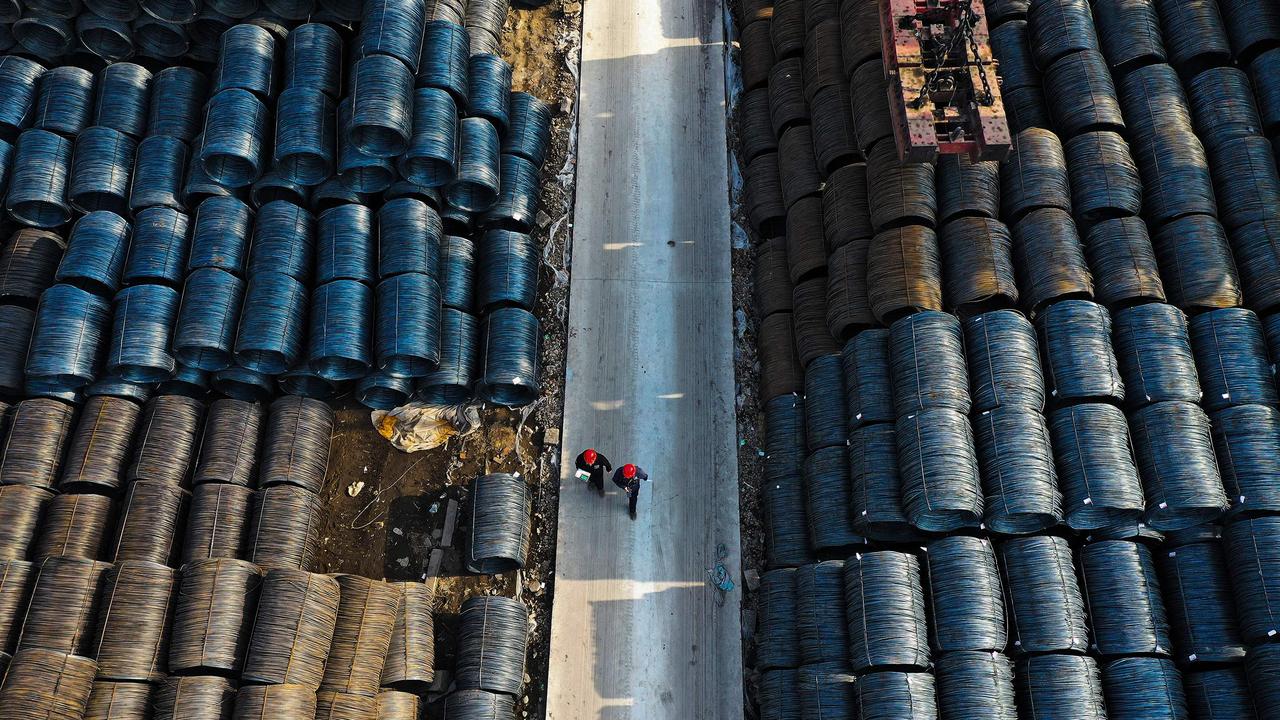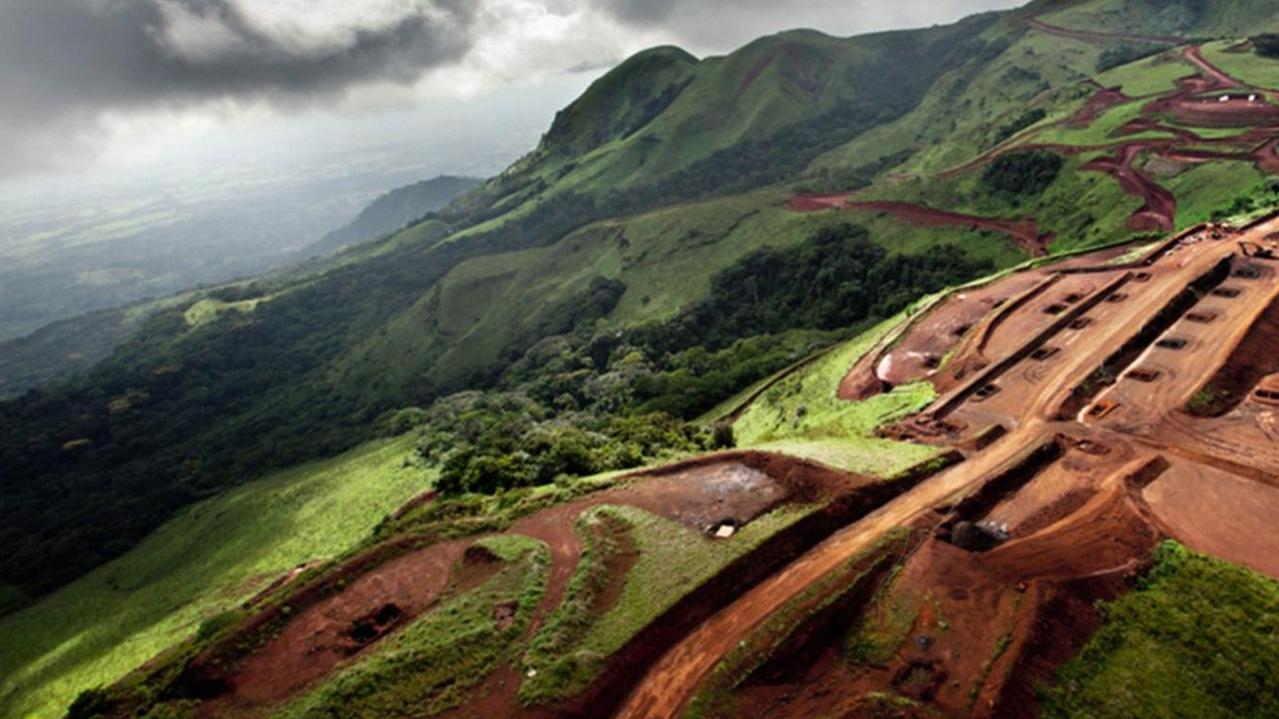30 per cent drop will hit Australia hard
Details about what’s being shipped out of Australia have revealed a concerning trend, amid warnings of an “economic winter”.
As Australia faces the prospect of an “economic winter” due to a major drop in the price of our most valuable resource — a revealing trend has been exposed in our latest export figures.
It has been warned this week that everyday Aussies could see tax increases and cuts to services due to the falling price of iron ore — a key ingredient in steelmaking.
For almost 30 years, prices have remained high and China has been buying it — mostly from Australia — at an insatiable rate to fuel its rapid growth. Last year iron ore exports alone pumped $136 billion into the economy, according to data from mining.com.au.
This, in turn, generates billions of dollars in tax to fund key Australian services.
Now struggling Chinese steelmakers have sounded the alarm on a concerning trend that could spell big trouble for Australia.
Top steelmaking firm Baowu admitted there would be no significant stimulus package from its Chinese Communist Party owners.

Its chairman Hu Vangming warned that the “winter” of steel demand from China’s struggling construction industry would be “longer, colder and more difficult than we expected”.
During previous downturns, China saved its economy — and by extension iron ore and steel sectors — by firing up into a debt-fuelled binge of construction. Given the warnings from steelmakers, it appears unlikely that China will do so this time.
Now, new data has emerged from the world’s largest bulk export port authority — Pilbara Ports — which oversees the export of hundreds of millions of tonnes of resources out of Australia’s mining capital in WA.
It shows that iron ore shipments leaving Port Hedland in July fell 20.4 per cent from June to 43.2 million tonnes.
Of that massive amount of ore shipped in July, the overwhelming majority, some 34.1 million tonnes or 78 per cent of it, was designated for China. That’s a huge drop of 14.4 million tonnes from the June export figures — or a drastic-sounding 29.6 per cent plunge.
Given the current price of iron ore that represents a $1.73 billion hit to our economy when compared to what miners exported last month.
An almost 30 per cent month-on-month drop certainly sounds concerning at first glance, but the figure is consistent with the total monthly throughput in July 2023.
What is interesting in the figures though is where the rest of the shipments are going.
They show that Australian miners are increasing sending shipments to other steelmaking nations in Asia to make up for the shortfall in Chinese orders.
Total shipments of ore to Japan and South Korea rose substantially.
Some 4.5 million tonnes of iron ore was sent to Korea. That’s 1.7 million more than in June and what was sent in July 2023 — marking an increase of 63.7 per cent.
Exports to Indonesia soared 82 per cent month-on-month, while shipments to Japan and Vietnam rose 34 per cent and 30 per cent respectively.
A Pilbara Ports spokesman said it’s not just market conditions driving the figures.
“Several factors influence the fluctuation of throughput, including changes in market conditions, port maintenance operations and proponent needs,” he said.
An unbreakable grip
Despite the rise in exports to other nations, the figures ultimately still show the sector’s unbreakable reliance on China.
Even despite a 63.7 per cent surge in exports to Korea, China is still importing seven times that amount of ore.
That’s because, despite a slowdown, China still produces more than half the world’s steel. The next biggest steelmaker — in a very distant second place — is India, but it also has huge iron ore resources so doesn’t need any from Australia for years to come.

That alone spells trouble for Australia but the problem could be made worse as a mega-mine in Africa look to come online in the coming years.
It’s feared this could result in a major surplus of iron ore globally. There’s already a surplus in global supply., one that Macquarie Bank has grimly named “one of the worst” ever.
Author Javier Blas of Bloomberg said the problem only to looks to worsen in the coming years.
“The slowdown in China comes, crucially, as a new generation of large, low-cost mines in Australia and Africa start production,” he said.
“That mix is the problem because it means the iron ore market, already oversupplied in the first half of this year, would remain in surplus in 2025, 2026, 2027 and probably 2028, too.”
$3 billion hit to Australia
The Albanese government warned this week that the “softness” of China’s economy and tumbling iron ore prices could leave a multibillion-dollar hole in the nation’s budget.
Troubles in China’s massive construction sector have seen iron ore prices drop about 30 per cent since the start of the year — and the ripple effects are now being felt Down Under.
Australia is the world’s largest producer of iron ore, the main raw component for making steel used in building homes, railways and other infrastructure.
Treasurer Jim Chalmers warned the “softness in the Chinese economy” and sinking iron ore prices were reminders that Australia was “not immune from volatility and uncertainty in the global economy”.
His department now believes that the faster-than-expected fall could reduce tax receipts by around $3 billion over the next three to four years.
The metal accounted for 18 per cent of Australia’s total exports last year. The lucrative trade with a rapidly growing China has bolstered Australian mining profits and Canberra’s tax coffers for decades.

But after months of worry about China’s ailing real estate sector and excess manufacturing capacity, the price of iron ore sank by more than seven per cent in the past week alone.
China posted weaker-than-expected growth in the June quarter. The world’s largest steelmaker China’s Baowu Steel Group warned that the sector’s troubles could be longer and more severe than expected.
Australian mining firms have already taken a hit, with shares in Rio Tinto and BHP — two of the world’s biggest producers — down roughly 20 per cent since the start of the year.
Reserve Bank of Australia governor Michele Bullock told parliament last week that given the country’s dependence on China, she was watching the situation closely.
“Developments in China can have quite a big impact on the way our trade develops, and therefore on our growth,” she said.
“It’s our biggest trading partner, and it’s very important in particular for the prices of the commodities that we export, in particular iron ore.”




